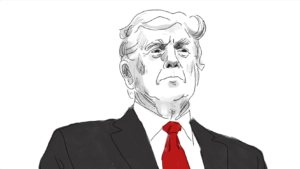On Monday, Feb. 20, President Donald J. Trump announced that he will be selecting Army Lt. Gen. H.R. McMaster to fill the National Security Adviser position after his previous pick, Michael Flynn, was asked to resign from his position.
Flynn has received criticism for talking to Sergey Kislyak, Russia’s ambassador, about United States sanctions. In December 2016, Flynn met with Kislyak and later denied that the conversations about sanctions happened. The conversation with Kislyak focused on relieving sanctions when Trump took office.
In January, a handful details about Flynn’s talk with Kislyak were published in a column by David Ignatius of the Washington Post. This drew concern from many, with the column mentioning that the conversation may have violated the Logan Act, which banned unauthorized people from dealing with foreign government disputes. Following the rumors, Flynn assured Vice President Mike Pence that sanctions were not discussed. Flynn continued to deny this up until his resignation.
McMaster was Trump’s second pick after he was turned down by Navy Admiral Robert Harward. McMaster has been described as “a man of tremendous talent and tremendous experience,” by President Trump.
On Wednesday, Feb. 22, the Trump administration announced that they will be recommending to states to dismiss the transgender bathroom laws that were previously put in place by former President Barack Obama.
The law, which set guidelines that instructed schools to let transgender students use the bathrooms that match their gender identity was put in place in May of 2016. This was considered by some to be a landmark decision as it was a step toward their civil rights.
Those who advocate for the transgender community are making their voices heard to “protect trans kids.” On Wednesday, the Department of Justice and the Department of Education issued letters to schools that said that the transgender bathroom issue should be left in the hands of the states as opposed to the federal government — and that the original guidance from the Obama administration caused legal confusion.
The Human Rights Campaign has demonstrated concern about the decision. “there is a dangerous message that the current administration will not enforce inclusive policies or stand up for trans students at school.”
White House officials have defended the measure, saying that this is a decision that the president believes should be left to the states to decide upon. The administration posits that the measure could potentially be more inclusive, as the process will happen at the local level, which will allow input from both teachers, students, parents and school administrators.
Students around the UMaine campus have their own opinions on the topic and some are tired of hearing about the two parties being in conflict.
“He [Trump] should work on finding a balance on this issue rather than trying to strike down something that has already been addressed,” Nick LaJoie, a third-year computer engineering student, said. “He should work on bringing together both political parties rather than pinning them against one another, because that is what politics are all about.”















